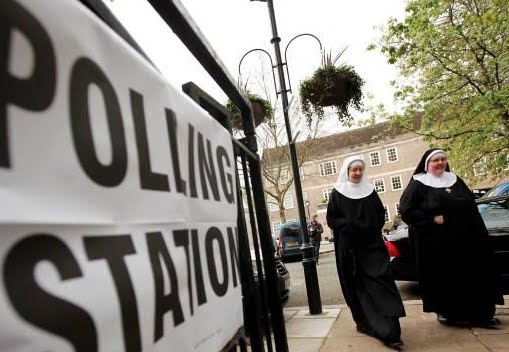We need to renew our parishes. In two earlier posts, I argued that our politics and economics often defines us more than the gospel and that the widespread breakdown of community life in our culture makes it difficult for parishes to counter these frameworks. These dynamics present challenges to the parish, but God gives the parish its mission. It is to be a community that loves God with all of its heart, mind, soul, and strength and loves its neighbors as itself.
I worry that we look for some “cheap grace” to solve this challenge, some extraordinary policy or radical practice that would make everything work correctly. Yet, if the task is truly building up love, there seems to me no other solution than the demanding and daily task of “ordinary” love. It is not lying, stealing, killing, and committing adultery. As John the Baptist said, it is giving your extra clothes and food to the person who has none, stop overcharging for goods, “do not practice extortion, do not falsely accuse anyone, and be satisfied with your wages.” It is, as Jesus said, providing food and water, clothing and sheltering people, visiting the sick and imprisoned, and welcoming strangers. Moreover, love must fundamentally be this way if salvation is for everyone. Love must be able to be practiced by 8 year olds and 80 year olds, by middle managers and the mentally challenged.
Thus, what I see as essential for the renewal of parish life might not seem radical, but I believe that it should not seem that way. In this way, it can respond to the challenges that the culture presents.
1. Liturgies: Doing liturgies well is the most fundamental task of the parish. It is an essential way in which people learn about God’s love for humanity and embody their love for God. I do not think that liturgies need to be a weekly parade of ecstatic experience but rather the priest and people performing worship in an unassuming and reverent way, a way that focuses on God. (This is M. Therese Lysaught’s point in chapter one of Gathered for the Journey.) The counterpart to this is, of course, people must go to mass. Just as one of the most significant factors in success at school is going to school, going to mass consistently is crucial for living the faith and renewing the parish.
2. Homilies: An essential part of good liturgies is the homily. It is an opportunity for people to hear the gospel interpret contemporary life (instead of politics or economics being the dominant framework). Homilies need not be long or presented with rhetorical flourish, but they should emerge from a week of study and reflection, built on a lifetime of prayer and formation. While it is hard to quantify this, if one were to follow the example of Martin Luther King, Jr. who liked to spend 40 hours preparing for a 1 hour lecture, then homilists should spend roughly 5 ½ hours preparing for an 8 minute homily. Parishioners also have a responsibility to be attentive to it. The better the homily, the easier it is to do this. Yet, this responsibility need not be limited to just listening. A former colleague of mine once noted that the most fruitful part of the homily for his family was the way they discussed, analyzed, applied, and revised it in the car on the way home.
3. Religious Education: Parishes typically have religious education programs. These are important and need to be vibrant. Almost all of my theology majors and almost every active member in our campus ministry came from strong youth ministry programs. Related to this, adults should prioritize their religious education. Whether this is personal study or parish programs, it is needed because, no matter how excellent one’s religious education was in one’s youth, it will be insufficient for handling life as a grown up and because parents have a responsibility to be the first teachers of their children (as John Paul II noted in Familiaris Consortio #36).
4. Prayer: There is no replacement for prayer. Whatever form it takes, it is the way loving God and neighbor grows within us. It does not replace action but it makes it possible to call forth our faith to guide our actions. It is the way we learn to frame our lives by the gospel. Parishes need to offer prayer opportunities like Eucharistic adoration, Stations of the Cross, and Vespers, but parishioners also need to find some time to pray in their lives.
5. Reconciliation: The sacraments give shape to the Christian life. As Michael Gorman has argued, much of Christian activity revolves around finding ways to overcome discord between people. Jesus’ ministry of forgiveness was central to his work. Paul’s pastoral advice entailed ways for communities to overcome division. So much of contemporary life is fraught with discord—politically, culturally, and personally—that a robust understanding of the sacrament of reconciliation and its practice could help us with this process of reconciliation. Along with its current emphasis on personal reconciliation with God, its implication for social reconciliation needs to become more pronounced.
6. Social Gatherings: There has to be moments when the community gathers just for the sake of fellowship. There has to be a time when people can get to know one another better. To carry out the task of love of neighbor that is celebrated in liturgy, people must get to know their neighbor. It is coffee and donuts after church or potluck dinners or game nights.
7. Family Ministry: Family life is difficulty, has always been and will always be. In fact, it seems that the best indicator for couples staying together is how they manage conflict. This should not surprise us as family life is rooted in love and love, as Christians understand it, entails the way of the cross. Moreover, family life is crucial for the well being of people, affecting their happiness, safety, finances, and work and educational success. People must work at their fidelity to one another and, even when marriages break down, they must work to avoid hostility and violence toward each other. It is such a fundamental institution that parishes need to (and do) attend to it. Marriage preparation should always be improving. Ministry to the divorced, widowed, and separated should continue. Ministry to maintain marriages should increase.
8. Hospitality: Parish life cannot stop with socials and family ministry. Love for Christians must always be expansive, moving out from the self to the friend then the neighbor, the stranger, and even the enemy. Parishes should thus be attentive to those who are new to the parish, welcoming them, making them feel like people are happy that they are there. On the individual level this entails basic kindness to those one meets in the pews. At the parish level, this needs to be a ministry. When I joined my current parish, they sent me a welcoming note, invited all the new members to a special reception (and a make up date for those who could not make it). The reception, put on by the parish’s hospitality ministry, featured a meet the pastor, tour of the church, registration forms for volunteering, and an impressive breakfast spread.
9. Visiting People: Feeling disconnected in our society is common. Being old or sick or poor or imprisoned exacerbates it. There are long standing ministries of the Church to attend to those who seem forgotten by the society at large. These ministries need to remain front and center. After the Eucharist in my current parish, they bring to the front all of the people doing home bound ministry to bless them in their work. It emphasizes that this is a work of the whole community. It should remind us not only that we as members of the parish have a responsibility to visit these people but also that we should attend to those in our own extended families who might be old or sick, poor or imprisoned.
10. Personal Invitations: When I was a child, our priest would visit our house about once a month. It was not something planned or elaborate. Often times it was just to say, “hello”. The result was that the priest found out that my father worked in accounting and computers and tapped him to help manage the church’s finances. (It was also how we realized the priest never took his full salary as a way to make sure that the Church was able to pay its bills and ministries.) Of course, the priest did not do this for just our family but almost every family in the parish. Because he knew what people could do, he could call upon them to help in unique ways. It created a vibrant parish where people experienced God’s call to love each other very concretely. At my current parish, we have 26 ministries. They are run by a cadre of lay volunteers and organized by a professional staff. Part of the reason for such a vibrant ministry, as best I can understand it, is the encouragement of the pastor. He hired a good staff, trusts them to do what is correct, and encourages their good ideas. He shows up to their events and promotes them but does not feel like he has to be in charge of or micromanage them. He encourages people to participate, his staff encourages people to participate, and the result is people participate. These people reach out to other people, and the result is a parish with a variety of ministries reaching a variety of people for a vibrant parish that constantly reminds me of the “body of Christ” metaphor that Paul used in 1 Corinthians.
These are ten practices that I see as important for renewing the parish. Some help us overcome the dominance of political and economic frameworks by fostering an understanding of the world in terms of the gospel—liturgy, homilies, prayer, religious education—while others, applying this perspective, helps us to address the breakdown of community life by nourishing our relationships with others—reconciliation, social gathering, family ministry, hospitality, visiting people, and personal invitations. They also should seem familiar, possible, and ways to love. On the surface, these practices might seem too individualistic or make the parish too sectarian. In my next (and last) post in this series, I will draw out the societal implications of these practices.
– – – – – –
There are so many great resources on parish life. Below are just a few that I used and would like to highlight:
Robert Putnam’s ideas for building community (From Better Together)
Growing Deeper in our Church Communities: 50 ideas for Connection in a Disconnected Age
Building Strong Church Communities
Renewing Parish Culture: Building for a Catholic Future





A very clear and concise list of activities to help us renew our parishes. Keeping the priest to an 8 minute homily is a significant step, but taking the time to discuss the homily at home is also important. Hospitality should be of primary importance. This charism defined the parish in which I was raised, but seems to be lacking for more recent parishes I’ve attended. How do we minister hospitality would comprise a good series of homilies.
I’m curious, though, about a juxtaposition in your article. You rightly note that ministry must follow what John the Baptist said and did– sharing the goods we have. But then you say the homily should interpret contemporary life, but exclude economics and politics. Isn’t that contradictory? And how can something that interprets contemporary life interpret it if it ignores the two largest factors of contemporary life? No, I’m afraid that if we are to renew our parishes we must in fact have homilies that address the here and now of our economics and politics because it it those here and nows which shape contemporary life. How could, for instance, a preacher address the shirt skirts and mid-rifs of modern fashion without talking about the economy of advertising and the politics of indifference which allow such clothing to flourish?
Thanks for the comment Obi-Wan-Ky. Just to clarify, for homilies, I was trying to say that homilies are a time when the gospel should be applied to contemporary life, including economics and politics, instead of the opposite, where economics or politics usually defines are spiritual lives, which is too often the case. In other words, I absolute agree with you!
This is a fine article that is equally practical and grounded in good theory.
I wonder if a lot of us nod our head while reading these fine points, but perhaps too quickly reply, “Yeah, we do that.”
For example, when the article talks of #8 hospitality and the welcoming note Prof. King received as a newcomer, in many parishes in my area, the sense is that the hospitality requirement is covered by the RCIA program. That would be a short-sighted conclusion, if you agree with the underlying message of systematically welcoming newcomers throughout the year. Also, the example of Eucharistic ministers taking the Sacrament to the home-bound is something I bet most parishes do, but Prof. King’s point about everyone needing to visit the “out of the way” people in our own neighborhoods shows that we can take that #9 point beyond the superficial.
I am a member of our parish council and I’d had thought that our work would center upon our considering best practices like the items on this Top 10, evaluating how well our parish meets those ideals, and planning for improvement across all areas of the parish. A common theme in this Top 10 is the laity getting involved in the life of the church, so I imagine Prof. King would agree with the laity helping in the strategic leadership of the parish. Dr. Boone and other experts have published good resources on the intersection of parish councils with these ideals of parish renewal, so I know that some people of influence understand the challenge.
Alas, in my experience at least, the clergy and institutional church do not appear much interested in having knowledgeable professionals help steer the ship; through benign neglect or for whatever reason, parish councils are permitted to flounder as mere party planning committees.
If the institutional church (ie: diocesan offices) want to make parish renewal a priority, the key to doing that in my view is to expect a strategic-level focus from the parish councils. How do you do that? It would begin with training. I was astonished to learn that neither our parish, deanery, nor diocese offers an orientation for new parish council members. Consider that for a moment. Every parish annually brings new people on board, and yet the task of training them is (apparently) a local matter, meaning it will not be done well or at all unless the local pastor has a special interest in it. Standardize the training and you create a new norm; in a few years, parish councils will rise to the expectation.
Finally, perhaps the overarching theme here in Prof. King’s article is that “just celebrating Mass” is a recipe for stagnancy. Therefore, from my perspective at least, the laity, through the parish council, need to be empowered to take a big picture, holistic look at their parish culture, programs, ministries, etc., and help build a more vibrant community.
At least, that’s what I signed up for. Until then, I’m happy to perform yeoman’s work at social functions, though I feel I ought to be doing more, though, apparently, mine is the minority view in my parish.